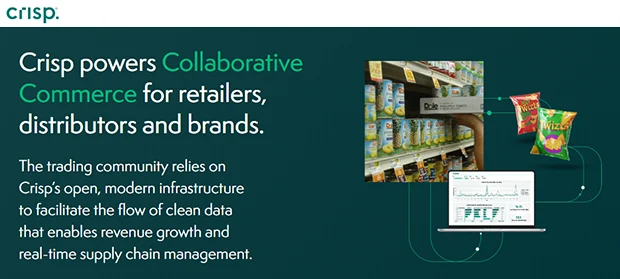Below is our recent interview with Are Traasdahl, CEO and Founder of Crisp:
Q: Can you share insights on how the latest Series B funding extension will impact the strategic growth initiatives of the company, and what specific areas are you planning to invest in for accelerated development?
A: We are continuing to invest in our platform and will be launching our fully redesigned reporting and analytics suite. We have already fully integrated the teams from our acquisition of Atlas. Now we will focus on our growth in Northwest Arkansas, home to Walmart and their thousands of suppliers.
Q: How does Crisp differentiate itself strategically from its competitors in terms of product innovation, customer satisfaction, and market penetration, and what unique value propositions contribute to its competitive edge?
A: While other point solutions in the market focus on a particular retailer or part of the supply chain, Crisp is the only agnostic platform that ingests, normalizes, analyzes and distributes data regardless of source or destination. With a collaborative commerce approach, the retail industry can make zero-waste supply chains a reality. When data is shared seamlessly between retailers, suppliers, and distributors, all parties can collaborate to efficiently meet demand, reduce waste, and grow profitably.
We already have 700 brands on the platform, representing some of the largest brands in the world including Hormel, Kraft Heinz, and Sanofi. We have also experienced continued success in offering our platform to distributors and cloud partners who can now easily share their data with their suppliers.
Q: Can you describe a typical use case or customer scenario for Crisp?
A: Crisp connects CPGs to real-time POS and inventory data from 40+ retailers and distributors, delivering store-level actionable insights and analytics through BI tools, cloud platforms, interactive dashboards, and more. Enterprise CPGs rely on Crisp’s retail data platform for actionable sales and supply chain insights to grow sales and streamline operations. Crisp’s mission is to reduce waste across the supply chain while giving brands and retailers the daily data and insights they need to grow their businesses.
Q: What are some of the real-world results enterprises can expect with Crisp?
A: Founded in 2003, ZURU Group expanded from its Kiwi roots to become a billion-dollar global powerhouse in the toy industry. Beyond the toy aisle, ZURU owns fast-growing brands in the pet, baby, and wellness categories.
ZURU Group leverages the Crisp platform to help them move faster and make smarter decisions around inventory management, merchandising, and marketing – ultimately becoming a trusted advisor to retail partners. A key supplier to major global retailers like Walmart, Target, and Dollar General, ZURU minimizes reliance on costly warehousing by sending inventory directly from its overseas factory to retailers. This model requires precise forecasting, but by harnessing real-time inventory and store-level data through Crisp, ZURU is now adept at making those real-time inventory decisions. As a result, ZURU has consistently kept shelves stocked in high-demand areas, while also reducing markdowns in slower-moving regions by over 50% in the last year.
Q: Any other interesting insight you would like to highlight?
A: Another interesting use case for retail data is to determine where to invest media budgets. poppi, the prebiotic soda pop manufacturer, uses shelf-level product data from Crisp to analyze and inform their digital media buying. poppi works with Crisp and Tinuiti, the largest independent performance marketing firm in the US, to answer the challenging question many CPG brands face of whether investments in digital advertising have a demonstrable impact on in-store sales. By overlaying media spend with in-store product data, poppi was able to overcome data silos and analyze the impact of its media investments. Preliminary insights derived by Tinuiti using Crisp enabled the soda brand to identify which channels are most effective at driving in-store sales. For example, geographics that were served an Amazon Online video ad were 15% more likely to purchase poppi products in-store that week than areas that were not served an ad. These early results demonstrate the strong potential of using in-store sales data to optimize marketing efforts.



